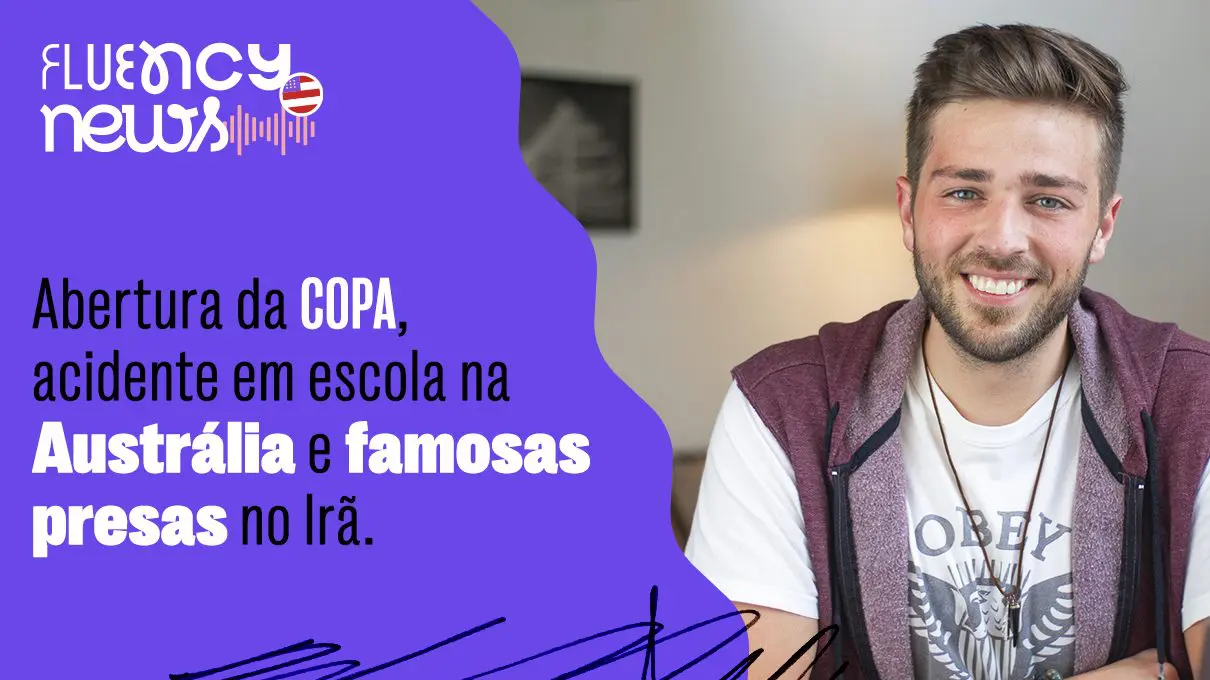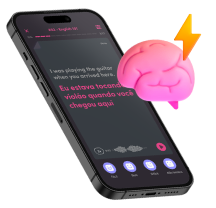Fluency News #109 – The World Cup opening ceremony causes mixed reactions, school experiment goes wrong in Australia and public figures in Iran are arrested

Sejam bem-vindos e bem-vindas a mais um episódio da nossa série de podcasts, o Fluency News!
Navegue pelo conteúdo
Hello, everyone!
Sejam bem-vindos e bem-vindas a mais um episódio da nossa série de podcasts, o Fluency News! Aqui você vai treinar a sua escuta e ficar por dentro do que está acontecendo no mundo, sempre com as principais notícias da semana, tudo em inglês! Ao longo do episódio, nós também adicionamos explicações em português das coisas que achamos que precisam de mais atenção, assim você não perde nenhum detalhe!
Neste episódio, você vai ficar por dentro da abertura da copa do mundo que surpreendeu e causou reações variadas, de um experimento escolar que deu errado e provocou acidente em escola australiana, e sobre as atrizes proeminentes que foram presas pelo governo iraniano após demonstrar apoio a manifestações. Come on, get ready!
Temos uma página de dicas de inglês no Instagram, vá conferir! @fluencytvingles
Toda semana, temos um novo episódio do Fluency News, não deixe de escutar! See you!
Transcrição do episódio
Hey you! What is up? Scott Lowe here and welcome to Fluency News, o seu podcast semanal de notícias totalmente em inglês, com explicações em português, para você treinar o seu listening, enquanto fica por dentro do que está acontecendo no mundo e aprende muito vocabulário e várias expressões diferentes!
I’m glad you’ve taken this time out of your day to practice your English!
Antes das nossas primeiras notícias, deixa eu te lembrar que a gente tem um canal no Youtube recheado de aulas e dicas tanto pra você que quer aulas completas e mais longas quanto pra você que quer dicas mais curtas porém muito úteis e divertidas!
Avisos dados. So now let’s get the show on the road!
Depois de tantos acontecimentos e atrasos, finalmente temos a tão aguardada copa do mundo! E como foi a abertura? Quais foram as figuras que deram as caras? Vem pra primeira notícia descobrir.
Actor Morgan Freeman has surprised the public by playing a starring role in the FIFA World Cup’s opening ceremony – having been the face of its rival, the USA, when competing for hosting rights of the tournament back in 2010.
Qatar ultimately, and controversially, beat the US, Japan, South Korea and Australia at the time but Morgan’s presence was not forgotten, especially his famous slip-up when he forgot to read one whole page of the speech. Consequently, several media figures noted how bizarre it was to see the actor play such an important role during the Qatari cerimony.
However, his presence at the cerimony was not the only thing that was talked about. The opening event cost multiple millions of dollars with the presence of artists including Jung Kook from BTS, who delivered a beautiful presentation, and dozens of other performers, but BBC completely ignored the event.
The network decided to not broadcast the event at all and instead reported on the corruption allegations and human rights violations, with the vocal participation of presenters, commmentators and even former players on the matter, reaching the conclusion that it is impossible to separate politics from soccer.
After a few minutes, the channel went back to discussing strategies, lineups and predictions about the games.
Suspeito né? Será que o Morgan Freeman já estava ajudando o Catar desde 2010? Será que ele já tava com esse job na mão? Brincadeira, claro que não… mas será? Nunca saberemos então vamo pra nossa primeira dica!
E vamos de dica de phrasal verb que vira substativo, que eu sei que todo mundo gosta! Ele tá aqui na frase:
Especially his famous slip-up when he forgot to read one whole page of the speech.
Aqui, estamos falando do famoso erro do Morgan Freeman quando ele esqueceu de ler uma página inteira do discurso. Aqui, usamos “slip-up” como substativo, um erro acidental, uma escorregada. Olha só mais um exemplo:
They scored a point because of Ron’s slip-up.
Eles fizeram um ponto por causa do erro do Ron.
Mas, como eu disse lá no início, esse é também um phrasal verb. Você consegue imaginar o que significa? Isso mesmo, “slip up” quer dizer errar, cometer um engano, dar uma escorregada. Olha o exemplo:
I slipped up and forgot to invite Gary.
Eu me enganei e esqueci de convidar o Gary.
Ou então
Kyle always slips up when he’s calculating these things.
O Kyle sempre erra quando calcula essas coisas.
And I always slip up when I try to read the word paralelepipedo!
Quem não gostava de aulas de laboratório na escola? Essas aulas diferentes são normalmente uma aventura, mas as vezes pode acontecer de uma aventura ir longe demais. Vamos ver o que aconteceu lá na Austrália.
Two primary school students suffered serious burns to their face and chest and were taken to hospital after a science experiment conducted outdoors in high winds went wrong at a school in Sydney.
They were among 11 students and one adult, the teacher, injured in the incident at Manly West public school on Monday afternoon. One of the students with serious burns was airlifted to the nearest children’s hospital while the other student was taken to that hospital by ambulance.
The nine other students and the adult were taken to the Northern Beaches hospitals by their parents and school staff, all in stable condition.
The so-called “carbon sugar snake” science experiment, which they were working on that day, typically involves ingredients such as bicarbonate soda, sugar, and a flammable liquid to trigger chemical reactions that create a long, blackened carbon sugar “snake”.
Com certeza esse dia nunca vai ser esquecido pelos alunos, pais e membros da equipe! Tomara que todo mundo continue estável e chegue logo em casa!
Pra segunda dica temos uma preposição muito repetida aqui nessa notícia, pra gente lembrar como ela funciona e quando nós usamos. A preposição da vez é o “by”, que foi usado de duas formas diferentes aqui na notícia. A primeira forma foi para indicar qual meio de transporte foi usado pra chegar em algum lugar, aqui nessa frase:
The other student was taken to the hospital by ambulance.
O outro aluno foi levado ao hospital de ambulância.
O “by” pode ser usado em frases como:
My mom goes to work by bus.
Minha mãe vai ao trabalho de ônibus.
I recommend going there by boat, it’s beautiful and quick.
Eu recomendo ir de barco, é lindo e rápido.
O outro uso do “by” é pra indicar quem realizou aquela ação, como vimos nesse trecho:
They were taken to the hospitals by their parents.
Eles foram levados aos hospitais por seus pais.
O foco aqui é que eles foram levados aos hospitais, e quem levou foram os pais! Olha mais dois exemplos:
Hilary was interviewed by my sister.
A Hilary foi entrevistada pela minha irmã.
Jake was questioned by the police.
O Jake foi interrogado pela polícia.
Resumindo: dependendo do contexto, o “by” vai indicar o meio de transporte usado ou quem foi o autor daquela ação. E quero que você fique de olho no “by” na nossa próxima notícia, ok?
E chegamos a ultima notícia de hoje! E já sabe né, tá na hora de compartilhar esse episódio com alguém que deveria estar estudando inglês com você, seja um crush ou uma amiga ou amigo, chama pra aproveitar o conteúdo aqui com a gente!
Você ouviu falar das meninas Iranianas que começaram um protesto contra o governo? Vamos ver em que pé está essa história!
Two prominent Iranian actresses, Hengameh Ghaziani and Katayoun Riahi, have been arrested for publicly supporting mass anti-government protests. Both women had appeared in public without their headscarves – in a gesture of solidarity with demonstrators.
The protests erupted in September after the death of a woman in police custody and included a very vocal response from high school students.
Mahsa Amini, 22, was detained by morality police in the capital, Tehran, for allegedly breaking the strict hijab rules. She died on the 16th of September, three days after being captured, but police denied that she was mistreated and said she suffered a “heart attack.”
Ms Ghaziani and Ms Riahi – both multiple-award winning actresses – were detained on Sunday on the orders of Iran’s prosecutor’s office, and before the arrest Ms Ghaziani wrote on social media that “whatever happens, know that as always I will stand with the people of Iran. This may be my last post”.
The actresses are among a number of high-profile Iranian public figures to have expressed support for the protests against the country’s government. Human rights activists have said that around 400 demonstrators have been killed and 16,800 others arrested by security forces.
At least five protesters have been sentenced to death in connection with the demonstrations.
Não foi dessa vez que terminamos com uma notícia leve e tranquila, mas é algo horrível que não vejo ganhar muita atenção por aí! Vamos ficar de olho.
Pra nossa dica final desse episódio vamos ver um uso diferente do verbo “stand”, como foi usado no trecho que uma das atrizes postou nas redes sociais:
Whatever happens, know that as always I will stand with the people of Iran
Que podemos traduzir como “O que quer que aconteça, saiba que como sempre, eu vou apoiar o povo do Irã” Aqui temos “stand with” com o sentido de apoiar e demonstrar solidariedade, e nesse caso foi mais voltado a uma causa. Olha só esses exemplos:
We need to stand with these victims.
Nós precisamos apoiar essas vítimas.
I’ve always stood with the human rights committee.
Eu sempre apoiei o comitê de direitos humanos.
Ok, guys! That’s it for this episode. Obrigado por me escutar até o final, foi ótimo vir aqui pra gente ficar por dentro das notícias. Não esquece de acompanhar a gente também lá no instagram @fluencytvingles! See you next week, peace!
Playlist







































































































 Curso de Inglês
Curso de Inglês
 Curso de Espanhol
Curso de Espanhol
 Curso de Francês
Curso de Francês
 Curso de Mandarim
Curso de Mandarim
 Curso de Italiano
Curso de Italiano
 Curso de Japonês
Curso de Japonês
 Curso de Alemão
Curso de Alemão
 Curso de Coreano
Curso de Coreano







 Blog
Blog  Podcast
Podcast  Lives
Lives  Aulas
Aulas  eBooks
eBooks  Minicursos
Minicursos














